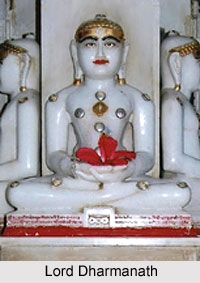 Lord Dharmanath was the fifteenth Jain Tirthankara of the current age, Avasarpini. As per Jain philosophy, he became a siddha, an enlightened soul which has demolished all of its karma.
Lord Dharmanath was the fifteenth Jain Tirthankara of the current age, Avasarpini. As per Jain philosophy, he became a siddha, an enlightened soul which has demolished all of its karma.
Lord Dharmanath was born to Emperor Bhanu Raja and Queen Suvrata Rani at Ratnapuri in the Ikshvaku dynasty. His birth date was the third day of the Magh Sukla month of the Hindu calendar. The being that was later to become Lord Dharmnath was Emperor Dridhrath of Bhaddilpur in Mahavideh area, in its earlier avatar. Though he inherited enormous wealth and a large kingdom, he led a detached and pious life like a lotus in a pond. He even received the praises of great saints who considered him as the embodiment of religious faith. After ruling for a long time Emperor Dridhrath in his later part of his life became an ascetic. Due to his unblemished character and sincere divine practices he earned the Tirthankar-nam-and-gotra-karma. Gradually after completing his age he reincarnated as a God in the Vaijayant dimension.
Resurrection of Lord Dharmanath
Lord Dharmanath in his next avatar descended into the womb of queen Suvrata, wife of Emperor Bhanuraja of Ratnapur. While the queen was pregnant she devoted most of her time in religious activities. Even the Emperor along with all other members of the kingdom became inclined towards devoting maximum time to different religious ans social activities like charity, righteousness, penances, studies etc. After some days a son was born to the queen on the third day of the bright half of the month of Magh. Due to the religious influence during the pregnancy period, the Emperor gave him the name Dharmnath. The prince grew amidst royal pleasures but he always remained detached form it. In due course he became young and was married. Later after his father he also ascended the throne. Dharmanath proved to be a kind hearted and generous ruler who took care of his subjects. After a long and successful reign he left the throne and kingdom and became and ascetic. After two years of rigorous divine practices he became all-knowing. His first religious discourse was attended by the fifth Vasudev Purush Simha and Sudarshan Baldev.
In his first discourse he chiefly dealt with the subject of form and ill effects of passions. A large audience was benefited by this eloquent discourse. Finally after travelling to different places he achieved nirvana at Sammetshikhar.




















